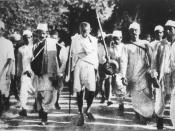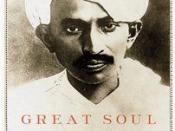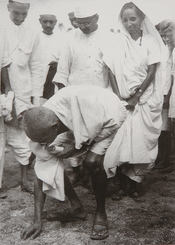The Mahatma, or "Great Soul"ÃÂ, was a man of great stature. He was born in India where he grew up to become an accomplished lawyer. While on a business trip on a train he had been racially harassed because of his Indian heritage. Passengers on the train sparked his fury as they assaulted him with rude remarks. Even though he had a valid first class ticket he was moved to the back of the train to better accommodate the other passengers. This particular event perhaps sparked the actions that would later take place in India, leading to impacts that still effect society today. This short Indian man was named Gandhi. He gained his fame through the embodiment and transcendence of India .
Gandhi embodied and transcended India by using passive resistance, practicing human rights, and setting examples for other countries that they would later try to follow. Even today Gandhi's wise soul is influential.
India was well known for its idea of passive resistance. Passive resistance is practiced through actions of non-violence. While the British were taking over India the people revolted with violence. Gandhi was one of the people that saw that there was no help when one acts violently. India itself preached non-violence but did not follow it.
Gandhi really did practice non-violence unlike the rest of India. Because India used violence against the British, the British could then react the same way. This would not solve the problems but make matters worse. While the people of India were about the streets looting, killing and rioting, Gandhi was praying, fasting, and preaching. It was what Gandhi practiced that brought India back together. Through non-violent practices such as the Salt March, the people of India got their point across to the British. The British in turn reacted with violence that disgraced their home country. Non-violence was brought to life by Gandhi. In order to get the attention of his people he fasted until they listened. This non-violent act worked. People listened to Gandhi and understood what was expected of them. He led his people to fight with non-violence though the people had never really used it before Gandhi. This rediscovery of non-violence by Gandhi embodied India. Since he was one of the first to practice it in India at the time, he was the one responsible for all of the benefits it reeked when it was accomplished amongst the people.
Human rights was a strong belief for Gandhi. Gandhi thrived on this fact in his teachings. He stressed the idea of tolerance and equality, factors that had once set India into two between the Muslims and the Hindus. Both religions had conflicting perspectives. What they considered sacred was one of the most dramatic differences.
Both religions had a certain hatred for each other. Cast systems were established in Hindu culture that actually separated people rather than unite them. Gandhi noticed this and realized it was in part responsible for separating India. Upon this realization he quickly dismissed his beliefs in Darmha in order to set an example for his followers. Darmha was a type of social system that made people better than others. The "untouchables"ÃÂ were the lowest of the system and they cleaned bathrooms and did all of the dirty work. In order to unite India he cleaned his own bathrooms and abolished the system. At first some people were hesitant. Even his wife had to disrespect her religion for the sake of India. He showed the people equality. He made this idea known to the British that the people of India wanted the same rights as the British. They wanted to be treated as equals and not animals. They wanted to be seen as a race of respectable being like the British. This idea was transcended and embodied by Gandhi fighting for rights the non-violent way and forcing people to disrespect their religions. He had tried to get the rights for his people through discussion. He asked the British if they could be a separate country but they would not listen. This is what forced the people to take action.
Gandhi was a moral icon. He was not the most handsome man in the world. He was actually very short and very skinny. The majority of adults towered over him. It was his teachings and what he did for India that made him a big man. What he had done for India through non-violence and his fighting for rights was well appraised by other countries. Africa who was also going through the same problems was motivated by Gandhi's actions in India. Some of his actions were reacted in Africa in hopes to gain freedom. People in Africa today are still looking for equality in today's U.S. society even though Gandhi is dead by now. People of the United States had also approved of his actions and his fame spread. People in the United States saw this action as patriotic and they very much respected it. They saw this as very similar to what they had done to England when they fought for independence as well. Some people say that if President Clinton had practiced such non-violent acts the United States would not have seen Hitler destroy so many people. For this reason many people look up to this man, including other American Heroes. Gandhi went beyond India and influenced other places around the world when they heard of his actions. These actions made him a powerful icon. His actions still transcend today as more children are taught of his brave and heroic deeds that were done without too much blood and gore.
Without Gandhi India probably would have gone into a bloody and hopeless war. His ideas and philosophy would have never spread across the globe if it hadn't of been for his bravery. Gandhi transcended India by becoming a moral icon, he embodied by using passive resistance, and his transcended and embodied human rights.
This "Great Soul"ÃÂ is known throughout the world, making him the most recognizable person in the world today even though his powerful soul is gone.





